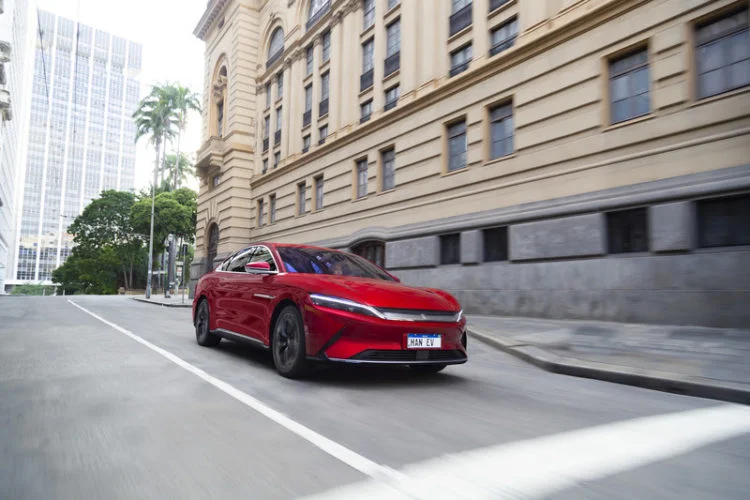In a significant leap forward for electric vehicles (EVs), BYD’s Blade Battery technology is setting new industry benchmarks, promising enhanced safety, longevity, and performance. As the world races towards sustainable mobility, BYD’s innovation could be a game-changer in the EV landscape. Recent reports from Electrek highlight that BYD has already begun incorporating Blade Batteries into their latest models, capturing global attention. In this article, we’ll dive into how this cutting-edge technology is revolutionizing EVs, making them more appealing to eco-conscious consumers and urban commuters alike.
Understanding BYD’s Blade Battery Technology
What Makes the Blade Battery Stand Out?
The Blade Battery, developed by BYD, is a lithium iron phosphate (LFP) battery. Unlike traditional lithium-ion batteries, the Blade Battery features a unique design that optimizes space and enhances safety. Here’s why it stands out:
- Safety First: The Blade Battery has passed stringent nail penetration tests, which are considered the most rigorous for battery safety. It remains stable at high temperatures and does not emit smoke or fire, even when damaged. This positions it as one of the safest battery options on the market.
- Durability: With a lifespan of over 1.2 million kilometers, the Blade Battery promises longevity that can outlast many vehicles themselves.
- Efficiency: The thin and long cell design allows for better space utilization, potentially increasing the driving range of EVs by up to 50%.
How Does It Compare to Other EV Batteries?
When comparing the Blade Battery to traditional NCM (Nickel Cobalt Manganese) batteries, several advantages become evident:
- Cost-Effectiveness: LFP batteries are typically less expensive due to the elimination of costly materials like cobalt.
- Environmental Impact: The absence of cobalt and nickel reduces the environmental burden of mining and makes recycling easier.
- Performance: While NCM batteries offer higher energy density, the Blade Battery’s design compensates by maximizing space and improving overall vehicle range.
The Impact of Blade Battery on Urban Transport
Transforming City Commutes
With urban transport systems increasingly prioritizing sustainability, the Blade Battery provides a robust solution. Its high safety standards make it ideal for densely populated areas where vehicle safety is paramount. The extended range and reduced charging times contribute to less downtime for city commuters, making EVs a practical choice for everyday use.
Enhancing Public Transport Systems
BYD is not only focusing on personal vehicles but also expanding the Blade Battery’s application to public transport. Electric buses and taxis equipped with these batteries are already being tested in cities like Shenzhen and Los Angeles. This shift could significantly reduce urban pollution levels, contributing to cleaner air and healthier living environments.
Practical Tips for Potential EV Buyers
How to Charge Vehicles with Blade Batteries
Charging an EV equipped with a Blade Battery is straightforward:
- Choose the Right Charger: Ensure compatibility with LFP battery systems. Most public charging stations are equipped for this.
- Optimal Charging Practices: To maximize battery life, avoid frequent full charges. Instead, aim for charging between 20% and 80%.
- Home Charging Setup: Consider installing a Level 2 home charger for faster and more efficient charging.
Where to Buy BYD Vehicles with Blade Batteries
As of 2023, BYD has expanded its market presence significantly:
- Global Availability: Models featuring Blade Batteries are available in key markets like China, European countries, and North America.
- Dealership Locations: Check BYD’s official website for a list of authorized dealers.
- Online Platforms: Some models may also be available through online automotive marketplaces, offering convenience and potential discounts.
What to Compare When Choosing Your EV
When selecting an EV, consider the following:
- Range and Efficiency: Compare the driving range and efficiency ratings of different models.
- Safety Ratings: Look for safety certifications specific to battery technology.
- Warranty and Support: Evaluate the warranty terms for battery performance and consider the availability of customer support services.
Conclusion: The Future of EVs with Blade Battery Technology
In summary, BYD’s Blade Battery technology is poised to reshape the EV industry by addressing key consumer concerns such as safety, cost, and environmental impact. For those considering the switch to electric, the Blade Battery offers a compelling reason to do so. As urban centers globally continue to embrace sustainable transport solutions, BYD’s innovation is likely to play a pivotal role in this transition.
Are you excited about the future of EVs with Blade Battery technology? Share your thoughts in the comments below. And keep an eye on BYD as they continue to lead the charge towards a cleaner, greener future. Embrace the future of sustainable mobility and experience the difference with BYD’s Blade Battery technology—where innovation meets practicality.

